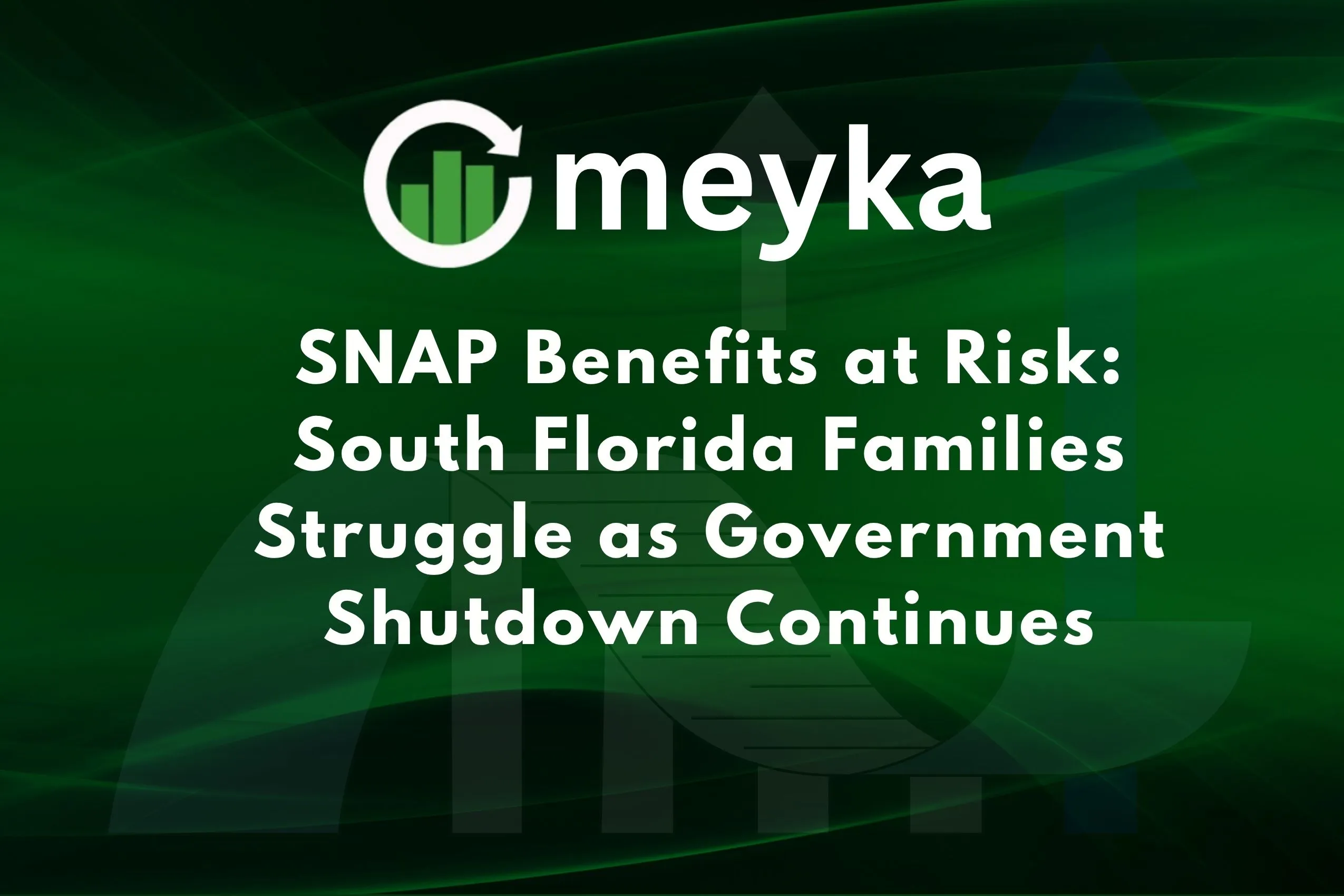SNAP Benefits at Risk: South Florida Families Struggle as Government Shutdown Continues
SNAP benefits, a lifeline for millions of low-income families, are now in jeopardy as the U.S. government shutdown stretches beyond its third week. Across South Florida, thousands of households are bracing for the possibility that food assistance could run out by early November if lawmakers fail to reach a deal.
The suspension of essential funding could leave many families without access to groceries, school meals, and nutrition support programs that depend on federal aid.
How the Shutdown Impacts SNAP Benefits in Florida
The Supplemental Nutrition Assistance Program (SNAP) serves more than 3.1 million Floridians, including seniors, children, and working parents. In South Florida alone, covering Miami-Dade, Broward, and Palm Beach counties, over 700,000 people rely on SNAP benefits to buy food every month.
With the government shutdown halting budget approvals, the U.S. Department of Agriculture (USDA) has warned that funds for November may not be available if Congress fails to pass a spending bill soon.
Local food banks and charities are already reporting surges in demand as families prepare for possible benefit delays.
Miami Families Fear Empty Shelves
In Miami-Dade County, where nearly one in six residents receives food assistance, community centers are overwhelmed. The Feeding South Florida organization says food demand has jumped over 40% in the past week alone.
Families who depend entirely on SNAP benefits for groceries are visiting food distribution sites earlier and more often. Many fear that if benefits stop, they won’t have enough to feed their children through the month.
For some, this crisis echoes the uncertainty faced during previous shutdowns, but the current one is proving more severe.
Broward County Sees Rising Food Bank Lines
In Broward County, the situation mirrors that of Miami. Lines outside community pantries have stretched for blocks. The Broward County Human Services Department reports a sharp rise in emergency assistance requests, especially from families earning below the federal poverty line.
Parents say that without SNAP benefits, they’ll have to make painful choices between paying rent, covering utilities, or buying groceries.
Some local officials have called for temporary state funding to bridge the gap, but with resources already stretched thin, few options remain viable.
Palm Beach Residents Turn to Charities
Palm Beach County, often associated with wealth, also faces growing hardship in its low-income neighborhoods.
Roughly 12% of residents in the area depend on SNAP benefits each month. Food pantries like CROS Ministries and The Lord’s Place have reported an increase in visitors, many of whom are first-time users of food assistance programs.
Volunteers describe heartbreaking stories of parents skipping meals so their children can eat. Without immediate government action, the crisis could deepen as early as the first week of November.
Preschool and School Meal Programs in Danger
The impact of the shutdown extends beyond traditional SNAP assistance.
Preschool feeding programs funded through the Child and Adult Care Food Program (CACFP) could also lose funding. Across South Florida, more than 2,000 early learning centers rely on federal reimbursements to provide daily meals.
If the shutdown continues, these programs could run out of funds within two weeks, forcing schools to cut meals or close kitchens.
For many children in low-income households, these school meals are their only reliable source of nutrition.
Local Leaders and Advocacy Groups Sound the Alarm
Local leaders have urged Washington to prioritize SNAP benefits in ongoing negotiations.
Miami Mayor Francis Suarez stated that federal inaction is “placing thousands of families on the brink of hunger.”
Nonprofit leaders echo the sentiment, warning that even a short lapse in food benefits could trigger a wave of food insecurity across the state.
Advocacy groups such as Feeding Florida and No Kid Hungry have called for an emergency extension of funding. They argue that the economic consequences of halted SNAP benefits could ripple through grocery stores, suppliers, and local businesses.
The Broader Economic Ripple Effect
The suspension of SNAP benefits would not only affect families but also local economies.
In South Florida, food assistance spending pumps millions of dollars into grocery stores and markets every month.
Economists estimate that every $1 spent on SNAP generates about $1.50 in economic activity, meaning the loss of benefits could lead to millions in reduced retail sales and job losses in the food industry.
Small grocers, farmers’ markets, and neighborhood stores that depend on SNAP transactions may struggle to stay afloat if the program halts.
Community Support Networks Mobilize
In response to the crisis, churches, charities, and local organizations have stepped up efforts to support struggling families.
In Fort Lauderdale, the LifeNet4Families food pantry is now serving more than 1,000 famlies per day, a 60% jump from earlier this month. Meanwhile, The Caring Place at Miami Rescue Mission| Broward Outreach Centers has expanded its food drives and community outreach.
While these community efforts provide temporary relief, they cannot replace the federal funding that supports millions of families.
How Families Can Prepare for Possible SNAP Delays
While the situation remains uncertain, families can take steps to manage their resources if SNAP benefits are delayed or reduced:
- Track spending carefully and prioritize essential groceries such as rice, beans, and canned vegetables.
- Connect with local food banks; many offer emergency supplies without income verification.
- Reach out to schools for updates on student meal programs and community feeding events.
- Seek assistance early, as demand for food aid is expected to rise sharply in the coming weeks.
Social workers in Miami and Broward have also encouraged families to apply for temporary local aid programs where available.
Federal Negotiations Remain Deadlocked
As of today, lawmakers in Washington remain divided on a federal spending plan.
The U.S. Department of Agriculture has not confirmed whether it can continue issuing SNAP benefits beyond early November without additional funding.
If no agreement is reached soon, Florida could be among the first states to face a full pause in disbursements.
Government officials have warned that millions nationwide could lose access to food support by mid-November, escalating an already severe humanitarian crisis.
Conclusion:
As the government shutdown continues, the risk to SNAP benefits grows more severe each day. In South Florida, where thousands depend on this program to feed their families, the uncertainty has already caused fear and hardship. Without swift intervention from federal leaders, food insecurity could rise dramatically, leaving vulnerable families to bear the brunt of political gridlock.
We believe that every household deserves access to basic nutrition. The longer the shutdown continues, the harder it becomes for families to maintain dignity, health, and stability.
Disclaimer:
The content shared by Meyka AI PTY LTD is solely for research and informational purposes. Meyka is not a financial advisory service, and the information provided should not be considered investment or trading advice.






